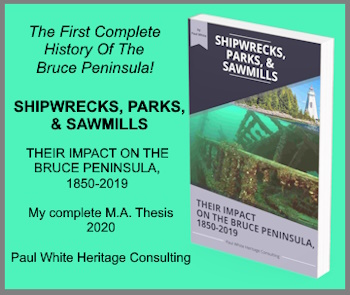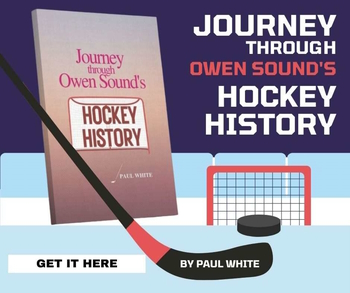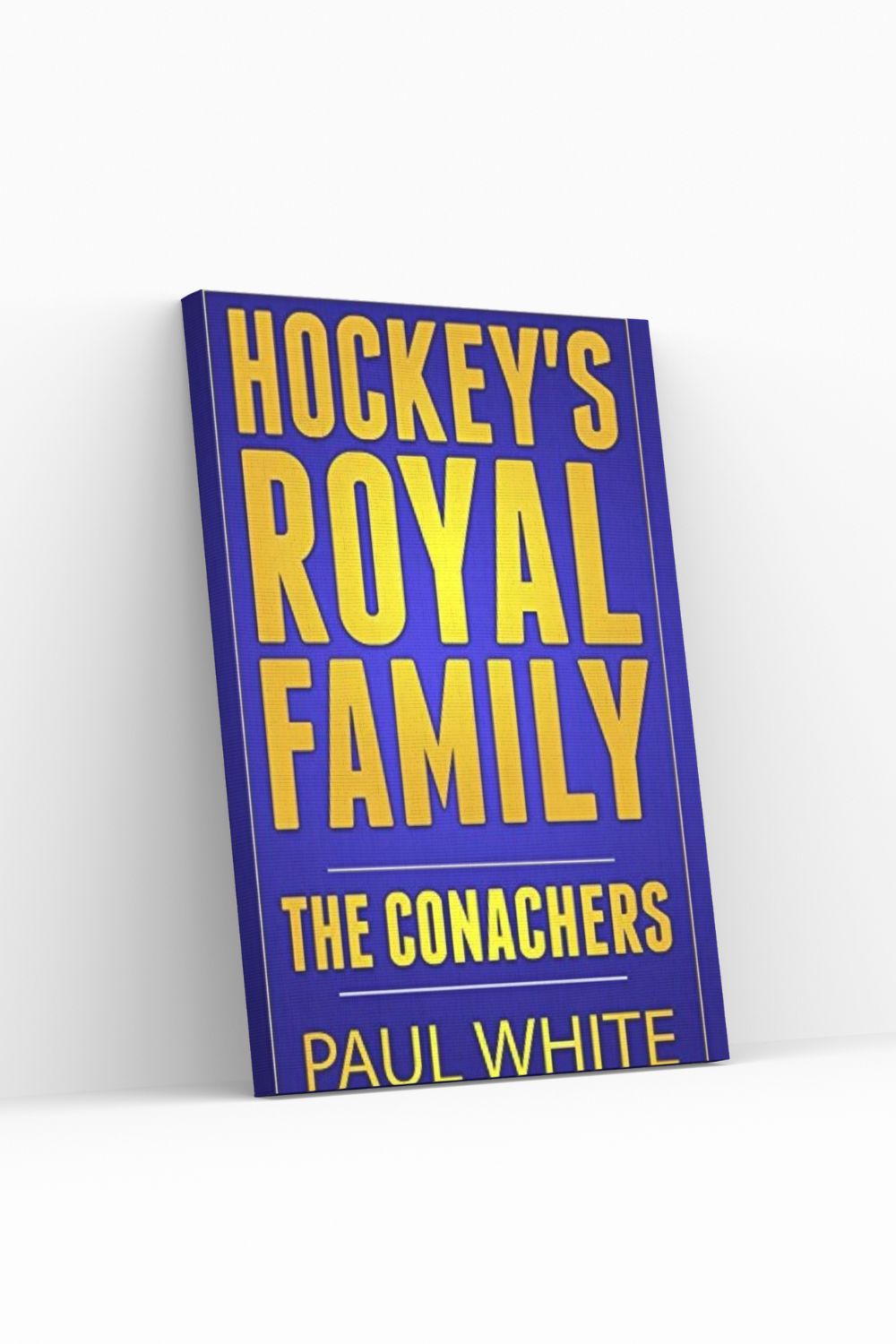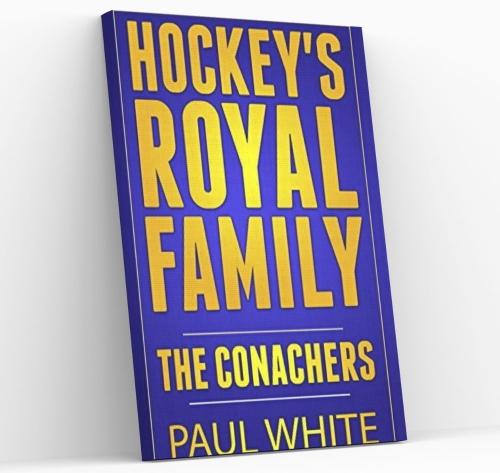"Red" Armstrong
"Red" Armstrong, a fiery spirited hockey player, known more for his fierce checking than his scoring prowess surprised even himself on his first NHL shift.
“TORONTO (CP)-The proudest hamlet in Canada Saturday night was a community called the Irish Block, population approximately 50.
The Irish Block is a cluster of farms just north of Owen Sound and it's the home of Norman (Red) Armstrong, a swaggering hockey player who made an eye-popping debut in the National Hockey League.
Armstrong played for only one minute and 31 seconds for Toronto Maple Leafs in their 8-2 win over the Boston Bruins but scored a goal the first time he touched the puck.
The rugged redhead was on the ice only 30 seconds before scoring his first N.H.L. goal - not bad for a fellow the Leafs sent home from their training camp this year. To top it off he also got an assist Sunday night against Chicago."
The above excerpt from a Canadian Press game summary printed on December 17, 1962 details a weekend series of hockey games which probably marked the highlight of Norman "Red" Armstrong's professional hockey career.
The dream started on Friday, December 14, 1962 when Armstrong scored the winning goal in the final moments of a game to lead his Sudbury Wolves to victory in the Eastern Professional Hockey League. After that game he was on his way to Toronto and the NHL.
The first time he touched the puck he scored. However, Armstrong's first NHL goal came just 25 seconds after he stepped on to the ice against Boston. But it was not the fastest first goal ever scored by a rookie. That honour goes to another Toronto Maple Leaf rookie Gus Bodnar who scored just 15 seconds after he first stepped onto the ice in a game in 1943. However, Red's goal did go down in the record books as the only goal ever scored by a rookie on his very first shot on net in the NHL. It was also the fastest first goal ever scored by a defenseman in the NHL.
"Red" Armstrong began his hockey career in Owen Sound. After playing local minor hockey he joined the Junior "B" Greys before he moved on to play in Sarnia and Woodstock for further grooming towards a professional hockey career.
He began his professional hockey career in the 1960-61 season playing for Charlotte of the Eastern Hockey League. The following year, (1961-62) he suited up with Philadelphia in the same league.
The fall of the 1962-63 marked the beginning of what was perhaps Red Armstrong's most tumultuous year in professional hockey. His rambunctious style of hockey in the Eastern Hockey League had attracted the attention of Toronto Maple Leaf Coach and General Manager, Punch Imlach. However, after one week of training camp, Imlach decided that the 25-year-old defenseman-winger was not "pro material".
Imlach sent him home. However, the gritty Armstrong was not about to hang up the blades. He tried out for the AHL's Cleveland Barons. However, problems arose on the day they were to play an exhibition game against the Chicago Black Hawks. The Toronto Maple Leafs AHL farm club, the Rochester Americans informed the Cleveland team that they owned Armstrong's rights.
Like the Leafs, the Americans did not want Armstrong either. But they did not want him playing for their rivals from Cleveland. It looked like Armstrong would have to return to Philadelphia and play in the E.H.L.
Fortunately, Murph Chamberlain the coach of the Sudbury Wolves of the Eastern Professional Hockey League had seen Armstrong play and felt that he could play in that league. The Wolves arranged a deal with the Maple Leafs for Red's services.
This move to Sudbury proved to be a positive step in Red Armstrong's career. Coach Chamberlain shifted him from defense to left wing. In his first 26 games he scored nine goals and assisted on 13 other markers. But his new-found scoring prowess was not what attracted Imlach to consider bringing him back to Toronto.
He earned the title of the heavyweight champion of the EPHL and the nickname "Fight-a-game" Armstrong. His feisty play and carrot red hair attracted a lot of attention and he became a fan favorite in Sudbury.
In December 1962 the Toronto Maple Leafs suffered a lot of injuries and their schedule included some games with Chicago which meant that they needed someone who could take care of the physical aspect of the game. Armstrong's reputation in the EPHL made him the perfect candidate to fill the Maple Leaf's need for a physical player.
After seven games with the Maple Leafs Armstrong was sent to the Rochester Americans. He played most of the rest of his career there, except for brief AHL stints with Baltimore and Springfield. In Rochester, Armstrong played along side and against such career minor league stars as Fred Glover, Gerry Ehman and Don Cherry. “Red” Armstrong became the captain of the Americans. He was a fan favorite and his hard-nosed style of play and his determination did not go unnoticed. His sweater, #6, was retired by the club.
"Red" Armstrong's moment of hockey glory came on a weekend in December 1962. Although his career in the NHL lasted only seven games, it must be remembered that during the pre-expansion era in the NHL there were hundreds of good hockey players who never experienced one moment in the bright lights of the NHL. To play hockey in the 1960s you had to be tough and able to take care of yourself. Norm Armstrong earned a name as a reliable two-way player who if challenged would stand up for himself and his team mates.
In 1974 the popular red head from the Irish Block died in an industrial accident in Sault Ste. Marie.
A version of this story first appeared in my Sports History column in the Owen Sound Sun Times in 1997. For more information about Owen Sound's hockey history, check out my latest hockey book, Journey Through Owen Sound's Hockey History.
More Great Information Pages
About Owen Sound Hockey History
The 1920s Owen Sound Hockey Stars made there mark in amateur ranks and then many of them went on to careers in the NHL and other professional hockey leagues.
The 1927 Owen Sound Greys with a priest serving as coach named Jack Spratt and not one experienced defenseman were an unlikely Canadian National Hockey Championship team.
Benny Grant: Memorial Cup Champ grew up in Owen Sound and enjoyed a hockey career, which included a surprising turn of events that led to a stint in the NHL.
"Buck" Jones, like most Canadian boys, dreamed of playing in the NHL. Little did he realize that one day he would wear the sweater of an NHL club and would be the idol of youngsters like himself!
The Chin Brothers dominated in their hockey league which drew attention from the Detroit Red Wings and the Toronto Maple Leafs.
Ralph "Cooney" Weiland skated from a Memorial Cup championship in Owen Sound, to a Stanley Cup in Boston to fame as a U.S. college hockey coach.
The Crescent Club has a long history of sponsoring sports teams and leagues in Owen Sound providing consistent management and financial assistance to athletics.
"Cyclone" Taylor was hockey's first superstar. Born in Tara Ontario, he was involved in a controversy in Ottawa which still has not been resolved.
Doug Brindley: From Maple Draft Choice to a role in Slap Shot: a Memorial Cup champ; coached by Don Cherry; and he played in the WHA; what more could a Walkerton Ontario native ask for in a hockey career?
The Durham Yellowjackets hockey team was a force to be reckoned with in Ontario Intermediate hockey in the 1930s.
Goalie "Red" Henry: An All-Star Netminder: Another great Owen Sound goalie who played for the love of the game.
"Hap" Day was a Hall of Fame hockey player, coach and general manager as well as a life-long Toronto Maple Leaf.
Norm Locking Chicago Black Hawks & Former Owen Sound Grey was known for his hard and deadly shot in Al Capone's Chicago.
Harry Lumley spent his Hall of Fame hockey career tending the nets for four NHL clubs and he spent one period of a hockey game goaltending for a fifth NHL team.
Henry Kelso: Owen Sound Sports Legend not only contributed to the sporting life of his students, he also had a significant influence on the rest of their lives.
Junior Hockey Commentary: Should there be controversy about the use of non-local hockey players? This article was written in 1998 in response to a letter to the editor in the Owen Sound Sun Times.
Meaford Knights Hockey: The 1953-54 Championship Knights' line-up had of several pairs of brothers. Many felt that the brothers made a winning difference.
Newspaper Sports: Owen Sound Hockey History was detailed in the pages of the Owen Sound Sun Times in detail in the days before the radio and television eras.
Owen Sound Hockey's early history some references suggest started in the 1880s. However there are records of organized hockey teams beginning in the early 1900s.
Owen Sound was a Hockey Hotbed in 1950-51: Their fans were hockey crazy during this OHA Senior A Championship season as their star-studded team marched to an Allan Cup victory.
The 1959-60 Owen Sound Greys: A Tough Act to Follow: Tragedy struck this hockey team of young men, yet they persevered.
The 1960s Owen Sound Greys Stars who went on to NHL action including Brian Perry, Doug Brindley, Jim Schoenfeld, and Jack Lynch brought Owen Sound a reputation as a hockey hotbed!
Owen Sound Attack: The arrival of this new OHL team is the latest chapter in the Owen Sound region's rich hockey history.
Owen Sound Goalies: Why does Owen Sound produce so many fine goaltenders? There must be something in the water!
Some Great Owen Sound Greys. The history of this hockey team is a story of players who were not only local boys, but came from many locations to hone their skills.
Owen Sound Hockey Heritage stretches from rural farmhouses on Saturday night to backyard rinks to cheering for local hockey successes and hockey heroes.
Owen Sound Junior Hockey History began almost one hundred and twenty years ago and is rich with championship teams, great players, and dedicated fans.
Owen Sound's New Arena in 1938 opened a new era in Grey and Bruce counties with the first artificial ice making machine in western Ontario north of Kitchener.
Owen Sound Platers: Ray McKelvie the quiet and knowledgeable leader behind the success of the 1999 hockey team.
Pat McReavy enjoyed a long hockey career which brought him three championships, the Stanley Cup, the Allan Cup and a World Hockey Title.
Paul MacDermid, born in Chesley Ontario, through hard work and determination enjoyed a 12 year NHL career, before keeping junior hockey alive in Owen Sound by working with a group citizens to purchase the Attack OHL franchise.
"Red" Armstrong, a fiery spirited hockey player, known more for his fierce checking than his scoring prowess surprised even himself on his first NHL shift.
Red Leckie was more than a good hockey player. He played for the team, not for himself. Outside hockey, he responded when he saw a need in his community.
Southampton hockey history in the early years featured a distinct line of defense in the local arena, and stories of interesting "road" trips.
Tommy Burlington: the Greatest North American Never to Play in the NHL captured scoring titles in every league that he played, bringing comparisons to NHL greats.
Owen Sound Hockey History is rich with stories of championship teams, star hockey players, and community support.





